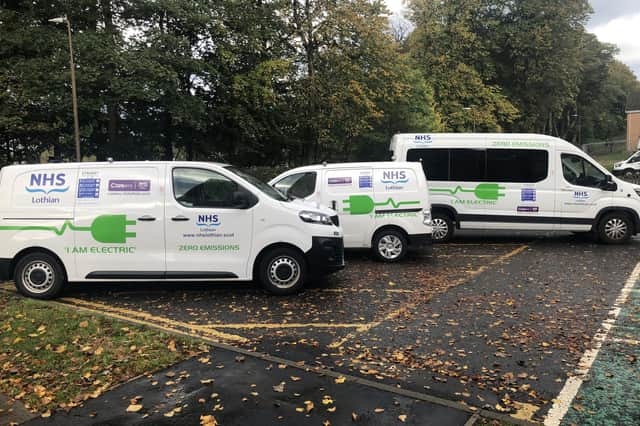NHS electric vehicle fleet expanded


The move is part of wide-reaching efforts to provide more sustainable healthcare.
The health board currently awaiting a further 55 electric vehicles to arrive, which will bring the current number used across Lothian to 362.
This is roughly half of NHS Lothian’s total fleet.
Advertisement
Hide AdAdvertisement
Hide AdIain Sneddon, the health authority’s transport manager, said: “Electric vehicles are the preference when we’re looking to grow our fleet or replace vehicles.
"Not only are they more cost-effective but they have the added benefit of being a cleaner alternative and much better for the environment.
“Climate change poses a significant threat to global health and its vital that we adapt to this as an organisation, not just as individuals.”
NHS Lothian received its first three electric vehicles in 2012.
Advertisement
Hide AdAdvertisement
Hide AdIn 2019, Transport Scotland provided funding which resulted in an additional 39 electric vehicles being added to the fleet.
Since then, the fleet has continued to grow.
Since 2019, the electric fleet has travelled over 1.8 million miles and has been used by teams such as podiatry, physiotherapy and forensic.
The average car emits 0.78 pounds of CO2 per mile driven, which means NHS Lothian has prevented around 500 tonnes of CO2 being released into local communities.
Dr Jane Hopton, Sustainability Lead for NHS Lothian, said: “Making our fleet greener is part of our wider strategy to ensure NHS Lothian is a leader in sustainable healthcare.
Advertisement
Hide AdAdvertisement
Hide Ad“We’ve also been working to reduce the impact medical gasses have on the environment, as well growing our green spaces and improving our energy infrastructure.
“Iain and his team have done a fantastic job over the last few years with the fleet and have clearly had a huge impact already on reducing NHS Lothian’s carbon footprint.”
A team of anaesthetists also recently received an award for their work in the Green Theatres programme to reduce the impact of medical gases, which account for around 5% of the overall carbon footprint of health services, on the environment in Lothian.